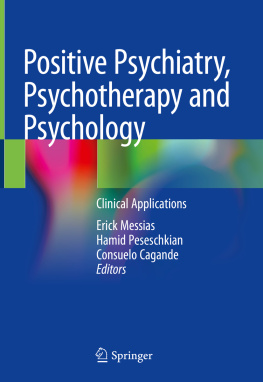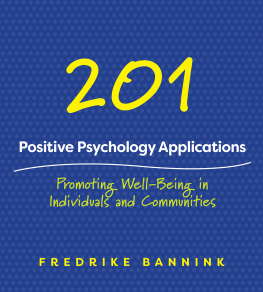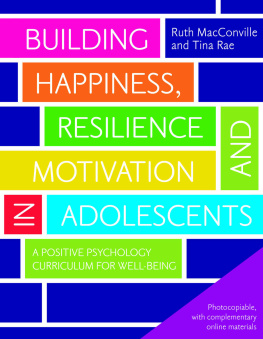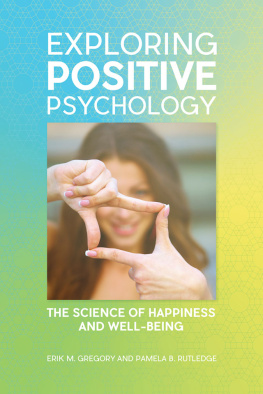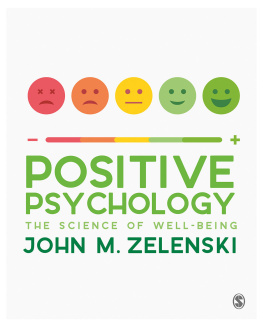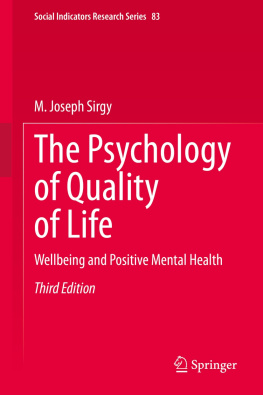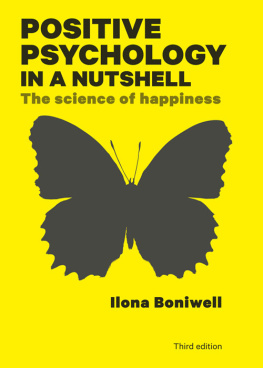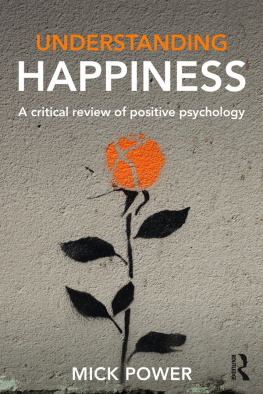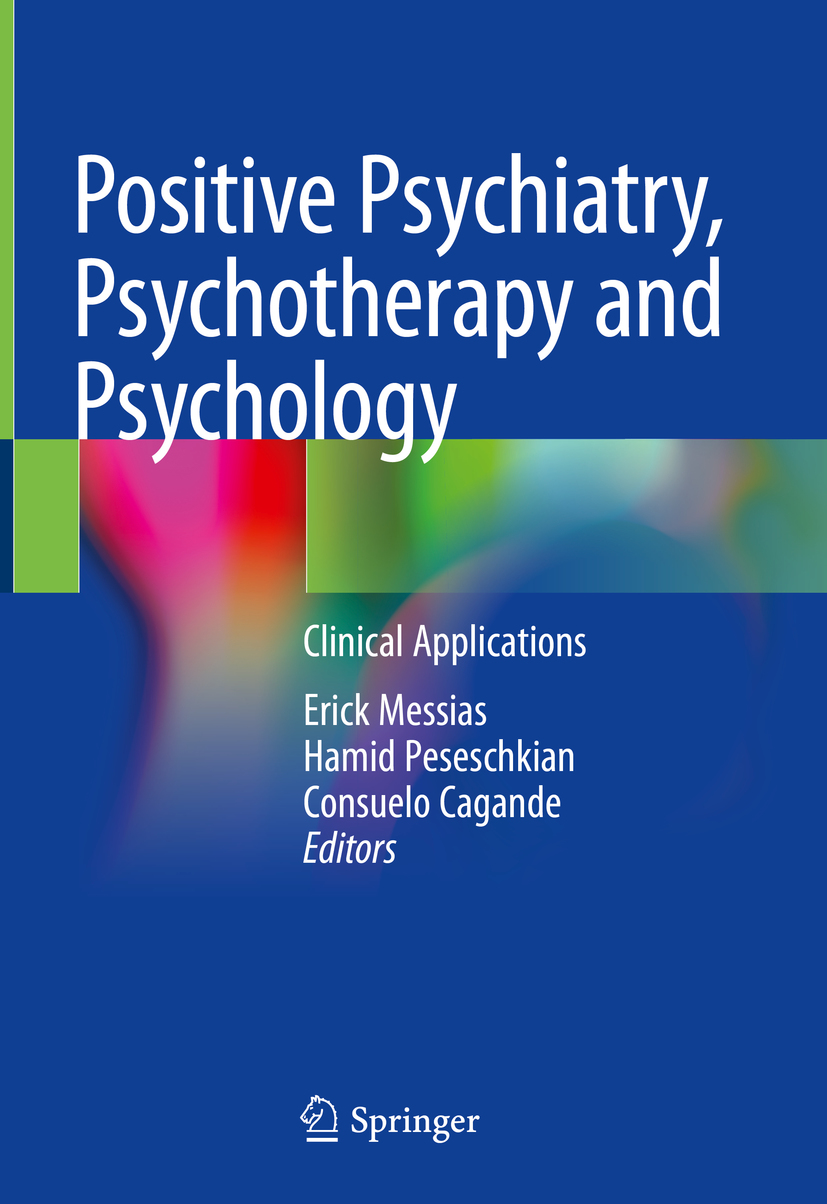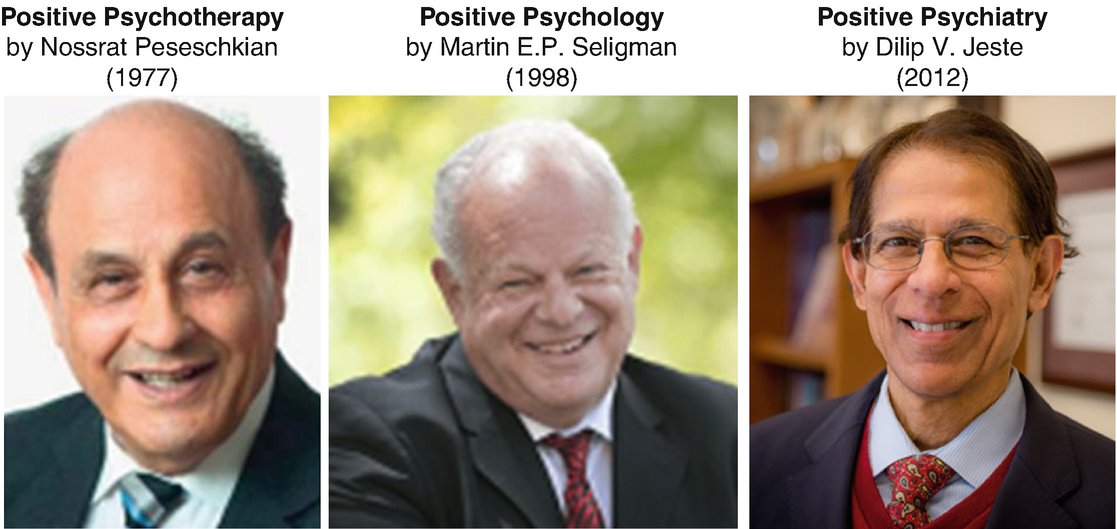Editors
Erick Messias , Hamid Peseschkian and Consuelo Cagande
Positive Psychiatry, Psychotherapy and Psychology
Clinical Applications
Editors
Erick Messias MD, MPH, PhD
Professor of Psychiatry, College of Medicine University of Arkansas for Medical Sciences, Little Rock, AR, USA
Hamid Peseschkian MD, DM, DMSc, IDFAPA
Wiesbaden Academy of Psychotherapy, World Association for Positive and Transcultural Psychotherapy, Wiesbaden, Germany
Consuelo Cagande MD, DFAPA, DFAACAP
Department of Child & Adolescent Psychiatry and Behavioral Sciences, Childrens Hospital of Philadelphia, Philadelphia, PA, USA
ISBN 978-3-030-33263-1 e-ISBN 978-3-030-33264-8
https://doi.org/10.1007/978-3-030-33264-8
Springer Nature Switzerland AG 2020
This work is subject to copyright. All rights are reserved by the Publisher, whether the whole or part of the material is concerned, specifically the rights of translation, reprinting, reuse of illustrations, recitation, broadcasting, reproduction on microfilms or in any other physical way, and transmission or information storage and retrieval, electronic adaptation, computer software, or by similar or dissimilar methodology now known or hereafter developed.
The use of general descriptive names, registered names, trademarks, service marks, etc. in this publication does not imply, even in the absence of a specific statement, that such names are exempt from the relevant protective laws and regulations and therefore free for general use.
The publisher, the authors, and the editors are safe to assume that the advice and information in this book are believed to be true and accurate at the date of publication. Neither the publisher nor the authors or the editors give a warranty, expressed or implied, with respect to the material contained herein or for any errors or omissions that may have been made. The publisher remains neutral with regard to jurisdictional claims in published maps and institutional affiliations.
This Springer imprint is published by the registered company Springer Nature Switzerland AG
The registered company address is: Gewerbestrasse 11, 6330 Cham, Switzerland
The editors dedicate this book in gratitude and admiration to the three founding fathers of the contemporary Positive Mental Health movement.
May their concepts continue to improve the life of people around the globe and inspire young professionals to follow their footsteps.
Foreword: Positive Mental Health
I am honored to write the Foreword for this wonderful book edited by three esteemed friends and colleagues: Erick Messias, Hamid Peseschkian, and Consuelo Cagande. At the annual meeting of the American Psychiatric Association (APA) in May 2018, there was a symposium on positive psychiatry, positive psychology, and positive psychotherapy in which the main speakers were the three editors of this book and myself. The symposium was well attended and generated considerable interest. The present volume can be considered a positive and lasting outcome of that symposium. A unique feature of this book is its global nature, with authors of the chapters coming from various continents and countries across the world as well as highly varied backgrounds.
The topic of this book is close to my heart. In 20122013, when I was the president of the APA, an important task for me was to ensure the finalization and publication of the fifth edition of theDiagnostic and Statistical Manual of Mental Disorders: DSM-5. I devoted a considerable amount of time to it and was happy that the task was accomplished. At the same time, I knew the limitations of the DSM. DSM is often called the Bible of psychiatry. I did not agree with that characterization. While the DSM is necessary for reliable diagnoses of psychiatric disorders, I felt that psychiatry was much more than a collection of mental illnesses. I take exception to the standard dictionary definition of psychiatry as a branch of medicine that focuses on diagnosis and treatment of mental illnesses. I believe that the definition must be broadened to also include study and promotion of mental health. While we must treat mental illnesses and prevent them when possible, the scope of psychiatry needs to extend beyond reducing psychopathology to emphasizing promotion of well-being and happiness.
Yet, I was struck by the fact that mainstream psychiatry had paid little attention to the positive aspects of mental health. In 2012, when I googled the term positive psychology, I got thousands of citations, but when I did the same for positive psychiatry, I did not get a single one. In the medical and other health-related literature, there were numerous papers on resilience, optimism, social engagement, and other positive traits. Yet very few of these were published in psychiatric journals they were mostly in psychology, sociology, internal medicine, family medicine, and pediatrics. Psychiatric textbooks were mostly restricted to mental disorders and risk factors, rarely mentioning wellness and protective factors. I made positive psychiatry my APA Presidential Theme. Positive psychiatry was defined as the science and practice of psychiatry that seeks to understand and promote well-being through assessments and interventions aimed at enhancing positive psychosocial factors and mental wellness. In my 2013 APA Presidential Address, I highlighted the journey from DSM-5 to positive psychiatry.
I was unsure how the concept of positive psychiatry would be received by others in our field. While there was some (expected) criticism and dismissals (is this opposite of negative psychiatry?), many more people supported the idea. Since then, there have been a number of symposia on this topic at various conferences, and these have often attracted standing-room-only crowds. In 2015, we published the first handbook on positive psychiatry, which became one of the best sellers for the APA Publishing. The formation of an APA caucus on positive psychiatry was soon followed by the development of a section on positive psychiatry in the World Psychiatric Association.
The notion of positive mental health is not new, of course. In modern times, it dates back to the early 1900s. During his Presidential Address to the American Philosophical Association, the philosopher/physician/psychologist William James proposed the notion of a mind-cure, conceptualized as the restorative powers of positive emotions and beliefs. Half a century later, this construct was expanded by Abraham Maslow and colleagues in the form of humanistic psychology. These psychologists believed that measuring and cultivating overall health and creativity was the best approach to improving outcomes in people with mental illnesses. The World Health Organization (WHO) has long advocated for a conceptualization of health that extends beyond symptom alleviation and absence of illness to a state of enhanced biological, psychological, and social well-being. In recent years, spiritual wellness has been added to the construct of health.

